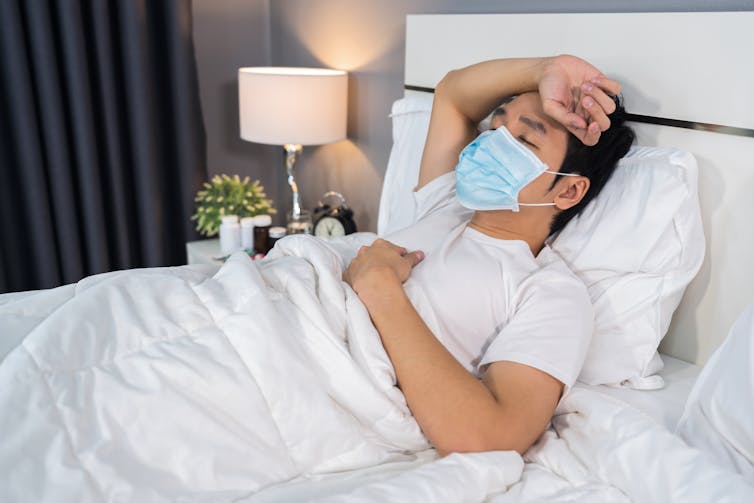Why don't most people with COVID need to test for another 30 days, even if they're re-exposed?
- Written by Jaya A R Dantas, Deputy Chair, Academic Board; Dean International, Faculty of Health Sciences and Professor of International Health, Curtin University

While Omicron continues to infect people across Australia and the world, many people who’ve already had COVID will likely be re-exposed to the virus.
Depending on your local rules, if you’re exposed again within 30[1] days of your last infection, you’re unlikely to need to isolate or get another COVID test.
In some countries, you may not need to re-test for 90 days[2], unless you develop new symptoms.
So why is this the case?
What’s the incubation period for Omicron?
The time between exposure to the virus and symptoms for COVID is between one and 14 days[3]. This lag time is known as the “incubation period”.
However, most people display symptoms by day five or six after exposure.
Emerging evidence suggests the median incubation period for Omicron is even shorter[4]. In US and European[5] studies, the median incubation time for Omicron was three days.
More reinfections with Omicron
Research suggests Omicron is more capable than past variants of reinfecting people who have already had COVID.
A study from the Imperial College London’s COVID-19 response team estimated the risk of reinfection with Omicron to be 5.4 times higher[6] than with Delta. So people who’ve had a prior COVID infection, from any variant before Omicron, were five times more likely to be re-infected during the Omicron wave than the Delta wave.
Omicron appears significantly more likely to evade the natural immunity[7] people build up from past infections.
How long should I wait before re-testing?
Global[8] studies[9] indicate you don’t need to re-test for 30-90 days after a COVID positive test if you’re re-exposed, depending on the jurisdiction.
This is because most people develop some immunity after recovering from the virus, so have a low risk of becoming re-infected in the short term.
A large study undertaken in one of Italy’s former COVID hotspots reveals people who’ve had COVID should be tested again, if re-exposed, only after at least four weeks[10].
This study found the virus takes an average 30 days to clear from the body after the first positive test result and an average 36 days after symptoms first appear[11].
Read more: If my child or I have COVID, when can we get our vaccine or booster shot?[12]
In Queensland[13], you don’t need to be re-tested or isolate if you’re exposed again within 28 days after ending isolating, regardless of symptoms. In New South Wales[14] it’s also 28 days and in Victoria[15] it’s 30 days, but you’ll need to get another test if you develop fresh symptoms.
If you come into contact with someone with COVID after this time frame, you’ll need to self-isolate, test and follow local advice.
This time frame is different in the United Kingdom. Following a substantial clinical review[16] of evidence and testing data in the UK, the government now advises waiting at least 90 days[17] after a positive test before retesting – unless you develop new symptoms.
Part of the rationale is you have a low chance of becoming reinfected within 90 days after testing positive. So it’s highly likely a positive test in this window would be a false result due to viral shedding, meaning you’d have to unnecessarily isolate.
The UK Health Security Agency defines COVID reinfection as having a positive test more than 90 days[18] after your last positive test.
Read more: What's the difference in protection against Omicron between 2 doses and 3 doses of vaccine?[19]
You should still get a booster dose
The evidence for the immunity we get from COVID infection is more limited than that for the immunity we get from vaccines[20].
Growing evidence[21] also suggests getting vaccinated after having COVID significantly improves protection and further lowers the risk of reinfection.
So the need for boosters[22] remains strong.
However, we should keep in mind the huge issue of vaccine equity[23], as many people including some health workers, the elderly and those immuno-compromised in low and middle income countries haven’t even received their first two doses yet.
References
- ^ within 30 (www.coronavirus.vic.gov.au)
- ^ re-test for 90 days (www.nhs.uk)
- ^ between one and 14 days (www.abc.net.au)
- ^ even shorter (inews.co.uk)
- ^ European (www.ecdc.europa.eu)
- ^ 5.4 times higher (www.imperial.ac.uk)
- ^ evade the natural immunity (www.who.int)
- ^ Global (bmjopen.bmj.com)
- ^ studies (www.cdc.gov)
- ^ four weeks (bmjopen.bmj.com)
- ^ 36 days after symptoms first appear (bmjopen.bmj.com)
- ^ If my child or I have COVID, when can we get our vaccine or booster shot? (theconversation.com)
- ^ Queensland (www.qld.gov.au)
- ^ New South Wales (www.nsw.gov.au)
- ^ Victoria (www.coronavirus.vic.gov.au)
- ^ clinical review (www.thelancet.com)
- ^ at least 90 days (www.nhs.uk)
- ^ more than 90 days (ukhsa.blog.gov.uk)
- ^ What's the difference in protection against Omicron between 2 doses and 3 doses of vaccine? (theconversation.com)
- ^ immunity we get from vaccines (www.cdc.gov)
- ^ Growing evidence (www.cdc.gov)
- ^ need for boosters (www.nature.com)
- ^ vaccine equity (www.who.int)

















